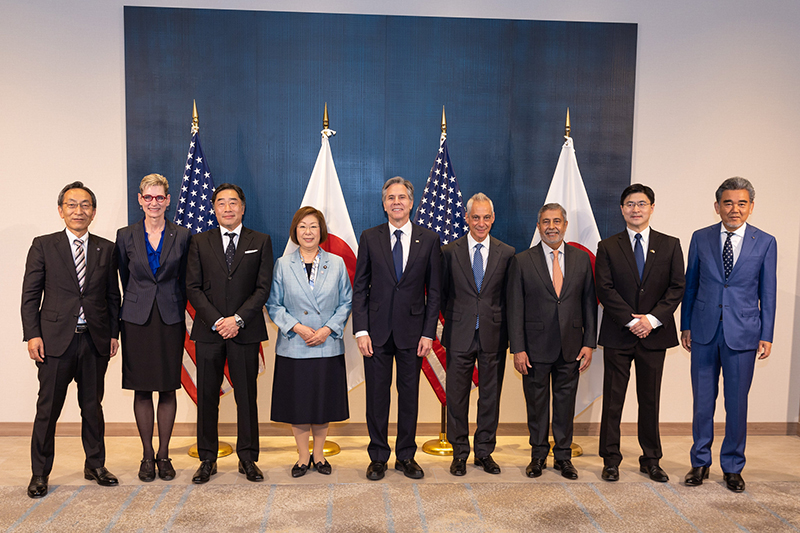Purdue signs landmark U.S.-Japan agreement in semiconductors at G7 summit

Purdue University President Mung Chiang on Sunday (May 21) at the G7 Summit in Hiroshima, Japan, signed another landmark international agreement to advance Purdue’s efforts in semiconductors production. Purdue is partnering with Micron, Tokyo Electron and other educational institutions in the United States and Japan to establish the “UPWARDS Network” for workforce advancement and research and development in semiconductors. The agreement was signed in the presence of, among others, U.S. Secretary of State Antony Blinken; Keiko Nagaoka, Japan’s Minister for Education, Culture, Sports, Science and Technology; and U.S. Ambassador to Japan Rahm Emanuel. The signatories later had a meeting with U.S. President Joe Biden at the end of the summit. (Photo provided)
WEST LAFAYETTE, Ind. —
Purdue University continues to be the world leader in creating vital partnerships in semiconductors.
On Sunday (May 21) in Hiroshima, Japan, Purdue President Mung Chiang signed another landmark international agreement, partnering with Micron, Tokyo Electron and other educational institutions in the United States and Japan to establish the “UPWARDS Network” for workforce advancement and research and development in semiconductors.
The announcement was made during this year’s Group of Seven (G7) summit in Hiroshima, which also included the Quad countries and other world leaders. The agreement was signed in the presence of U.S. Secretary of State Antony Blinken; Keiko Nagaoka, Japan’s Minister for Education, Culture, Sports, Science and Technology; and Rahm Emanuel, U.S. Ambassador to Japan. The signatories later had a meeting with U.S. President Joe Biden at the end of the summit.

A White House statement noted “the finalization of a memorandum of cooperation on education and technology and the launching of new partnerships between U.S. and Japanese companies and universities, including the University of Chicago and Purdue University, in areas like quantum computing and semiconductors.”
“Purdue is the leading American university in semiconductor talent, innovation and industry partnership,” Chiang remarked during the signing ceremony. “We are excited to partner with the semiconductor companies and other institutions for semiconductor collaboration between the U.S. and Japan. We will also launch the Negishi Fellowship in addition to the UPWARDS Network program to strengthen such collaboration.”
The May 21 trip also included meetings with leaders and representatives of Hiroshima University, Tohoku University and the U.S. Embassy in Japan.
Secretary Blinken said: “To all of the leaders who are here from U.S. and Japanese industry, from educational institutions, kicking off these new initiatives today, from IBM, Google, Micron, Tokyo Electron; Universities of Tokyo, Hiroshima, Tohoku, Chicago, Purdue, Boise State – this is an extraordinary group of institutions, individuals, (and) partners in this endeavor.”
Ambassador Emanuel said: “These partnerships are about seizing economic opportunity and strengthening economic security. When we connect leading companies with leading colleges, we position ourselves to lead in critical technologies.”
Micron and Tokyo Electron, as founding industry partners, the National Science Foundation and universities together will invest over $60 million for the five-year project. Other U.S. university participants included in the MOU are Boise State University, Rensselaer Polytechnic Institute, Rochester Institute of Technology, the University of Washington and Virginia Tech, while the Japanese university participants are Hiroshima University, Kyushu University, Nagoya University, Tohoku University and Tokyo Institute of Technology.
This is Purdue’s third semiconductors global partnership this month, following:
- On May 9, together with Minister Ashwini Vaishnaw, Purdue signed a milestone alliance with the government of India to be a key collaborator with India and the India Semiconductor Mission.
- On May 2 in Washington D.C., together with Indiana Gov. Eric Holcomb and U.S. Sen. Todd Young of Indiana, Purdue and the Indiana Economic Development Corporation formed a partnership with Belgium-based imec for microelectronics industry research and semiconductor workforce development.
Purdue is now the only university in the U.S. with bilateral partnerships in semiconductors with Europe, India and Japan.
On April 18, Purdue University, along with Krach Institute of Tech Diplomacy at Purdue, the Semiconductor Industry Association and SEMI, organized leaders from industry, government and academia at a summit in Washington, D.C., to forge national solutions at scale to address the future of U.S. innovation in microelectronics and the semiconductor workforce, featuring a keynote fireside chat among Chiang, Young and U.S. Secretary of Commerce Gina Raimondo. Over 175 companies, government agencies and universities participated in the event.

Addressing critical national semiconductor needs
Purdue continually works to answer the call for semiconductor workforce development with the Semiconductor Degrees Program, the first comprehensive set of innovative, interdisciplinary degrees and credentials in semiconductors and microelectronics in the country. The SDP is advised by an industrial board consisting of CTO/EVP-level executives of more than 25 leading global semiconductor companies and has been endorsed by the CEOs of many of these companies.
Purdue has also partnered with Ivy Tech Community College, the nation’s largest singly accredited statewide community college system, to develop industry-driven credentials and experiential programs. The collaboration brings Purdue’s resources to populations that may not have had access to this type of program while upskilling a motivated workforce.
Additionally, Purdue announced in June 2022 that MediaTek Inc., a leading global fabless chipmaker, would open the company’s first semiconductor chip design center in the Midwest, to be housed on Purdue’s campus. That was followed by U.S.-based SkyWater Technology, which announced in July 22 a $1.8 billion investment for locating a major semiconductor manufacturing facility in Discovery Park District at Purdue.
And earlier this year, Purdue committed $100 million to semiconductor research and learning facilities as part of the 3-pronged Purdue Computes initiative.
Purdue has been recognized by Fast Company as one of the World’s Most Innovative Companies for its advances in workforce development in semiconductors and microelectronics.
Deep-standing ties with Japan
There are deep-standing ties among Purdue, the state of Indiana and Japan.
From March 28-30, a Purdue delegation led by Chiang visited Japan and held 17 meetings with government officials, university presidents, industry leaders and alumni organizations. On March 29, at the U.S. Ambassador to Japan’s historic residence in Tokyo, Chiang met with Emanuel and announced that the late Ei-ichi Negishi, a Purdue chemist who won a Nobel Prize in Chemistry in 2010, would be honored with the creation of the Negishi Fellowship for Japan-Purdue Collaboration. The fellowship will grow the bidirectional student exchanges and research collaborations between top Japanese universities and Purdue in trusted technology development. The fellowship will be available to both graduate and undergraduate students.
A Japanese citizen, Negishi came to Purdue in 1963 to work as a postdoctoral researcher in chemistry under Herbert C. Brown. Negishi stayed until 1972, returned in 1979 and retired as the Herbert C. Brown Distinguished Professor of Chemistry in 2019. Negishi’s work in creating a method to build complex organic molecules necessary for numerous purposes – from pharmaceutical manufacturing to electronics – led to a Nobel Prize in chemistry. The Negishi-Brown Institute was created at Purdue in 2011 to support basic research in catalytic organometallic chemistry through graduate and postdoctoral fellowships, regular workshops and symposia, and establishing new relationships with industrial partners.
Purdue has MOUs with multiple Japanese universities, including a recently celebrated 25-year partnership with Tohoku University regarding semiconductors, quantum, spintronics and more. In addition, Purdue has ongoing discussions with academic and industry leaders in Japan about advanced manufacturing, economic development and research collaboration.
Locally, Subaru has been one of largest employers in Tippecanoe County (home of Purdue) since 1989. Subaru of Indiana Automotive Inc. is the automaker’s only manufacturing site outside of Japan.
Indiana is home to over 300 Japanese businesses (more than 67,000 jobs supported), and Japan is the largest source of foreign direct investment to the state. Among the United States, Indiana has the largest amount of Japanese investment per capita. Furthermore, many Indiana-based companies, including Eli Lilly, Cook Medical, Cummins, Urschel Laboratories and Zimmer Biomet, have operations in Japan.
About Purdue University
Purdue University is a top public research institution developing practical solutions to today’s toughest challenges. Ranked in each of the last five years as one of the 10 Most Innovative universities in the United States by U.S. News & World Report, Purdue delivers world-changing research and out-of-this-world discovery. Committed to hands-on and online, real-world learning, Purdue offers a transformative education to all. Committed to affordability and accessibility, Purdue has frozen tuition and most fees at 2012-13 levels, enabling more students than ever to graduate debt-free. See how Purdue never stops in the persistent pursuit of the next giant leap at https://stories.purdue.edu/.
Media contact: Tim Doty, doty2@purdue.edu



